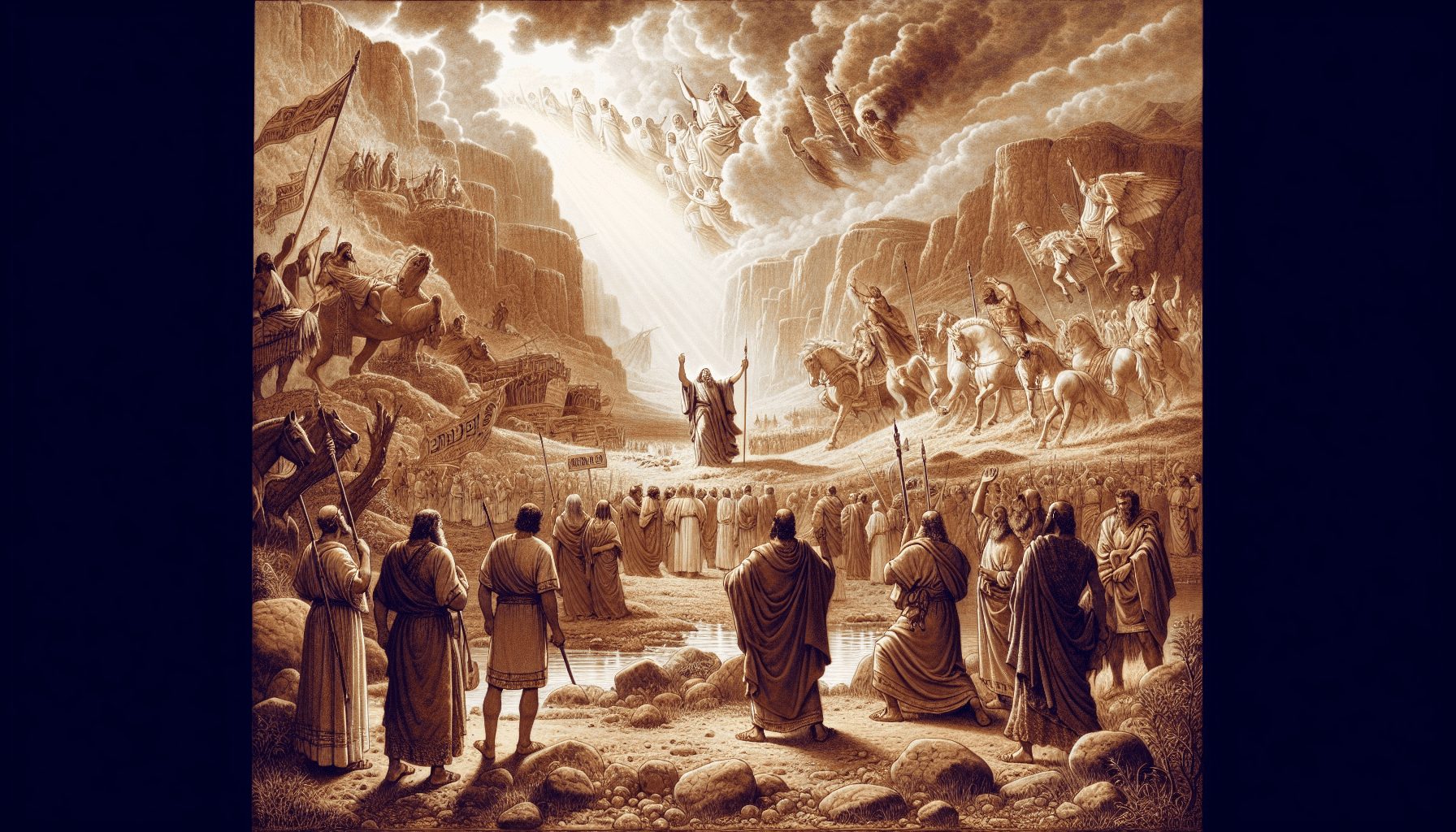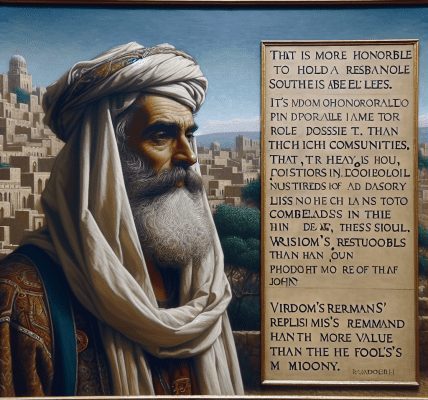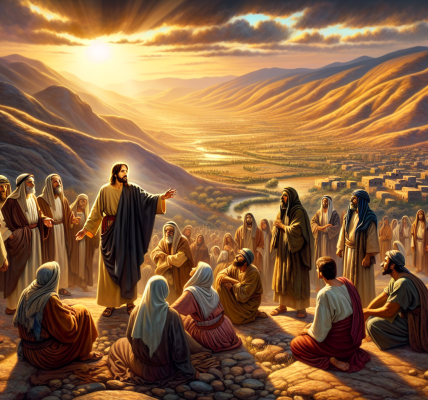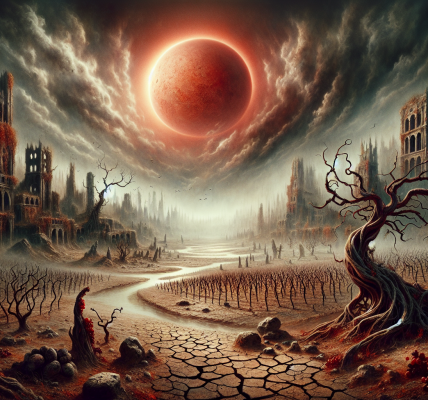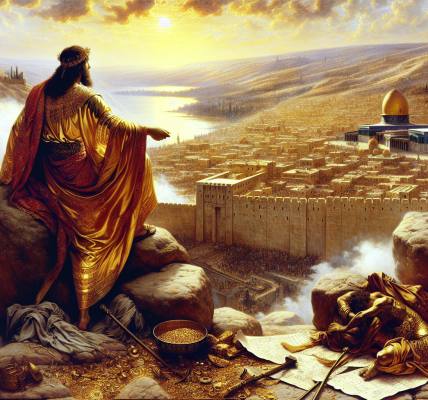**The Vision of Isaiah: A Call to Repentance**
In the days when Uzziah, Jotham, Ahaz, and Hezekiah reigned as kings of Judah, the word of the Lord came to Isaiah, the son of Amoz. It was a time of great turmoil and unrest, for the people of Judah had turned away from the Lord their God, though they still went through the motions of worship. The land was filled with injustice, and the cries of the oppressed rose like a bitter incense to the heavens. It was in this context that Isaiah received a vision—a divine revelation that would echo through the ages.
The vision began with a thunderous proclamation: *”Hear, O heavens, and give ear, O earth, for the Lord has spoken!”* The heavens themselves seemed to tremble at the sound, and the earth stood still, as if holding its breath. The Lord, the Creator of all, was about to address His people, and His words would cut to the heart of their rebellion.
*”Children have I reared and brought up,”* the Lord declared, *”but they have rebelled against me.”* His voice was heavy with sorrow, like a father whose children had turned their backs on him. The people of Judah, once chosen and cherished, had become like wayward sons and daughters. They no longer recognized the hand that had fed them, the arms that had carried them, or the voice that had called them by name.
The Lord continued, His words sharp and unrelenting: *”The ox knows its owner, and the donkey its master’s crib, but Israel does not know; my people do not understand.”* Even the beasts of the field, dull and unthinking, showed more loyalty and gratitude than the people of God. They had forgotten their Maker, the One who had delivered them from slavery in Egypt, who had led them through the wilderness, and who had given them a land flowing with milk and honey.
The land itself bore the scars of their sin. Cities that once thrived with life and joy now lay desolate, their streets empty and their gates broken. The countryside, once lush and fertile, was now a wasteland, scorched by the fires of divine judgment. The people had brought this upon themselves, for they had forsaken the Lord and embraced idols of wood and stone. They had turned their backs on justice and mercy, choosing instead to oppress the weak and exploit the poor.
Yet even in their rebellion, the people continued to offer sacrifices and observe religious festivals. They came to the temple with their burnt offerings and their incense, thinking that these outward acts would appease the Lord. But their hearts were far from Him, and their worship was nothing more than empty ritual. The Lord saw through their hypocrisy and declared, *”What to me is the multitude of your sacrifices? I have had enough of burnt offerings of rams and the fat of well-fed beasts; I do not delight in the blood of bulls, or of lambs, or of goats.”*
The Lord’s voice grew louder, filled with righteous indignation: *”When you come to appear before me, who has required of you this trampling of my courts? Bring no more vain offerings; incense is an abomination to me. New moon and Sabbath and the calling of convocations—I cannot endure iniquity and solemn assembly.”* The people’s worship had become a stench in His nostrils, for it was tainted by their unrepentant hearts.
But the Lord did not leave them without hope. His judgment was not the final word. He called them to repentance, to turn away from their wickedness and seek His face once more. *”Wash yourselves; make yourselves clean; remove the evil of your deeds from before my eyes; cease to do evil, learn to do good; seek justice, correct oppression; bring justice to the fatherless, plead the widow’s cause.”* The path to restoration was clear: they must abandon their sin and embrace righteousness.
The Lord extended an invitation, filled with both warning and promise: *”Come now, let us reason together, says the Lord: though your sins are like scarlet, they shall be as white as snow; though they are red like crimson, they shall become like wool.”* The offer was staggering in its grace. No matter how deep their sin, no matter how far they had fallen, the Lord was willing to forgive and cleanse them. But there was a condition: they must be willing and obedient. If they refused, they would face the consequences of their rebellion. *”If you are willing and obedient, you shall eat the good of the land; but if you refuse and rebel, you shall be devoured by the sword; for the mouth of the Lord has spoken.”*
The vision ended with a sobering reminder of the Lord’s holiness and justice. The once-glorious city of Jerusalem, the city of David, had become a harlot. Its leaders were corrupt, its rulers were companions of thieves, and its people were lovers of bribes. They had turned away from the Lord, and now they would face His judgment. Yet even in this, there was a glimmer of hope. The Lord promised to purify the city, to remove its dross and restore its former glory. *”I will restore your judges as at the first, and your counselors as at the beginning. Afterward you shall be called the city of righteousness, the faithful city.”*
As Isaiah emerged from the vision, his heart was heavy with the weight of what he had seen and heard. He knew that the people of Judah stood at a crossroads. They could heed the Lord’s call to repentance and experience His mercy, or they could continue in their rebellion and face His wrath. The choice was theirs, but the consequences were eternal.
And so, Isaiah began his ministry, proclaiming the word of the Lord with boldness and clarity. He called the people to turn away from their sin and return to the God who had loved them and chosen them. His message was one of both warning and hope, a reminder that the Lord is slow to anger and abounding in steadfast love, but He will by no means clear the guilty. The vision of Isaiah would echo through the centuries, a timeless call to repentance and a testament to the enduring mercy of the Lord.
